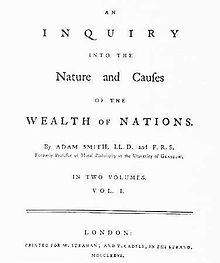Smith's economy, however, was all about free trade, where everyone could trade whatever they wanted/needed, no matter if it was an import or an export. Smith's ideas were based on the idea that all people are selfish, and he famously wrote, "It is not from the benevolence of the butcher, the brewer, or the baker that we expect our dinner, but from their regard to their own interest." His point was, if one could make a system where everyone could trade of their own will (called a free market), then everyone would get what they wanted. The consumer could buy the products they like, and the seller could get money (which they like, too).
Alexander Hamilton was of the merchant class, and merchants came to love and live by Smith's economic ideas. Hamilton's idea of the Federal Bank also took advantage of the ideas that the government could profit by harnessing people's self-interest. Debt does not seem like something anyone would want to buy, but if you add a little incentive (like interest), that quickly changes. Now, rich people with extra money laying around and can buy bonds that they will be repaid for later, but with interest! Now, buying the government's debt can be profitable to people, so they are motivated to do that. They don't want to help the government out of the goodness of their hearts, they want to do it because they can get something out of it.
The idea that people are selfish is an important one when it comes to economics and politics. People's opinions of which work better, capitalism or communism, often boil down to the question of if they think humans are innately selfish. Systems that prosper when people are self-centered (like democracy and capitalism) tend to be more successful than systems that require everyone wanting to be equal and sharing (communism). Does the relative success of selfish societies prove that all people are selfish, or is it just chance and circumstance that caused the differences? That is up to you to decide.
http://www.investopedia.com/updates/adam-smith-wealth-of-nations/

Your post was really insightful and connected theory (Smith's philosophies) to practice (Hamilton's actions). Reflecting on your question about the relative success of selfish societies, I think almost every economic system is a double-edged sword. In the case of free market capitalism, the apparent benefit is that the system taps human nature (the inclination to serve oneself and acquire wealth for oneself) cleverly in order to sustain an economy that makes profits while affording reasonable prices of goods to consumers due to competition. However, the capitalist market can be volatile at times, and it gets increasingly so with more venture capitalism, entrepreneurship, and investments that carry high risks and uncertainties. Perhaps one of the most well-known examples was the Great Depression of 1929, which was primarily caused by the stock market crash earlier the same year. Another cause of the Depression was that companies' profits were soaring while they expanded to the bubbling point; this led to the nation's wealth being concentrated in the hands of the richest 1%, which inhibited economic growth. To compound the problem, there was minimal government intervention and regulation of banks, which led to big loans being given to reckless speculators. It can be argued that all of these causes are symptoms of a capitalist system. One can come to the conclusion that although a "selfish" society may experience great success and prosperity at times, the economy of said society suffers severely when these selfish practices and governing styles are taken too far and become too out of control.
ReplyDeletehttp://www.ushistory.org/us/48.asp
I agree that capitalism too has its downsides. A prominent social woe is inequality: those who have a lot of money/resources/opportunities have the means to succeed more, while those who do not are often left behind.
DeleteYou brought up some really interesting ideas in this post! Your question reminds me of the quote we read in Federalist Paper #51: "If angels were to govern men, neither external nor internal controls on government would be necessary." James Madison was referring to politics, but I think this also applies to economics. If men and women were perfect angels, communism would create a society where wealth is distributed evenly and everyone had a fair share of work to do. The truth of the matter is that human nature is inherently selfish. Throughout history, communism has led to disaster because there is little incentive for the people to work. With capitalism, everyone is encouraged to work in order to accumulate wealth. Of course, this is not exactly an ideal society. Capitalism does create an unequal distribution of wealth. However, capitalism has been more successful because it uses selfishness to benefit the economy. For communism to be successful, the people would have to be angels.
ReplyDelete